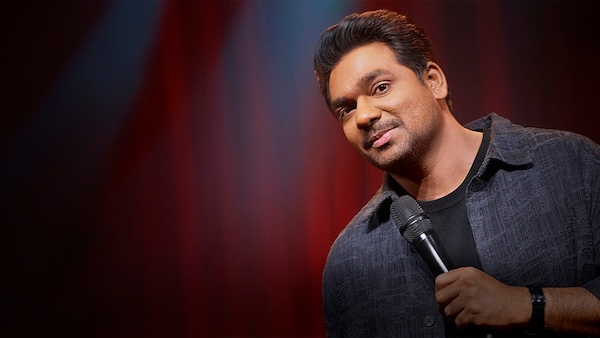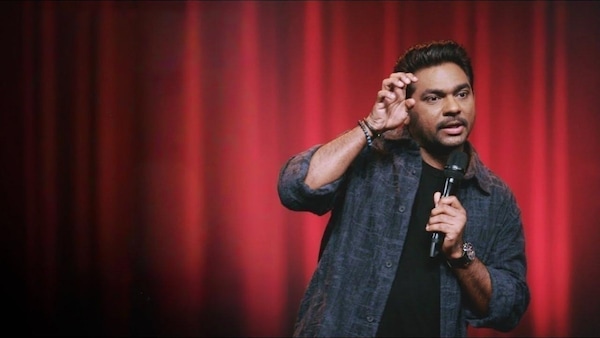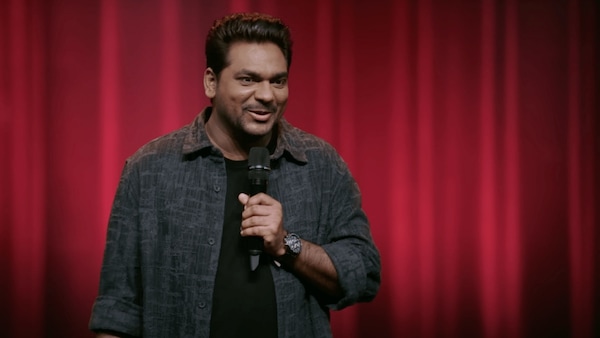Delulu Express: We're All Aboard Zakir Khan's Train of Thought
In Delulu Express, Zakir Khan takes the scenic route through memory, melancholy and middle-class life. Ishita Sengupta reviews.

Last Updated: 03.25 PM, Apr 01, 2025
This column was originally published as part of our newsletter The Daily Show on April 1, 2025. Subscribe here. (We're awesome about not spamming your inbox!)
***
WATCHING ZAKIR KHAN do stand-up comedy is to reckon with the limitations of the art form and the possibilities of it. It is to witness regular observations carry the weight of a punchline and existential thoughts take flight with the lightness of humour. It is to see a man holding the audience in thrall even with his silence.
Tathastu in 2022 was a genre-defying set that wrapped thoughts about his parents, concerns about mortality, and filial resentment in humour without punctuating them with gags. His latest Delulu Express does something similar without reiterating the format or style. It is a lighter arrangement imbued with excessive style and multiple characters. On paper it is more chaotic but beats with the same narrative heart that Khan has been honing since Tathastu.
It is difficult to not keep bringing up Tathastu as a point of reference to everything Khan does and will do in the future given how it shifted the landscape for stand-up. But to his credit, the comedian showcases an extension of his style with the new work. He brings back his parents but situates them at the back foot without relegating them to a footnote. Instead, he discusses his first job as a writer at a radio station and the anxiety and joy of it. Delulu Express is the train journey he took for the interview.
Using this as the outline, Khan talks about unemployment, the woman he was attracted to, the judgement men are subjected to in terms of their careers as opposed to women (men are always asked where they are working, he says), the moods women are prone to. This is tricky territory for good reasons.
A large chunk of Khan’s fame resides in cultivating the persona of someone who gets men. One of his most oft-quoted phrases is “sakht launda” — implying a tough man who can resist temptations.

In Delulu Express, he does not articulate this but hints at it throughout. Khan recollects the time he met a girl who he was instantly attracted to. After talking over the phone for days, she called him home. He skips the details but the implication is evident. The audience cheers on and he proceeds on to share the one time she was texting him and when not receiving a reply (Khan was struggling to find a train at a deserted station) proceeded to snap at him within the gap of minutes. The comedian stands clueless, exasperated with the sudden segue.
Standing on the threshold of being sexist, the premise is straight out of a Luv Ranjan film. There is a monologue somewhere on the internet about it but Khan manoeuvres with wit and charm; and although he frames his jokes around women, he resists reducing them to a punchline. It’s a master class of sorts where Khan carves out a way to talk about the other sex without using the easy crutch of sexism.
The delight of watching a Zakir Khan stand up is to also witness the fragility of the middle class and get a front row seat to the rare possibility of when someone from the class breaks out. Khan talks about the meagre income he received from his first job, requests for increments that were turned down, and the time he quit his job after gathering courage from his father’s phone call. It is a terrific moment that distills the brittle bravery of the strata. Laughter accompanies most of his observations but the desperation stings.

The details were as follows: He has to go to Delhi from Indore. It is Eid but his boss doesn’t care.Khan books train tickets only to find the timings have been changed. He undertakes an arduous journey of longer routes, more trains and empty stations to fulfill the whim of a system that has no empathy for him. At some point he breaks. His father calls him and eggs him on to be less scared. Infused with this new found strength, he quits on the spot. Seconds later, his father calls him again with another piece of advice: don’t be too hasty. Khan makes it funny but the tragedy of the setting — of the working class not allowed even the luxury of choice — looms large.
Throughout the set, Khan sneaks in one callback after another. The arrangement, a hallmark of a great storyteller, is so well done that it holds up when the hilarity wanes. There is something else, however, that is impossible not to consider when watching Khan perform. At the time of writing this, another comedian has been battling FIRs and the ire of politicians for something he said. Mentioning the name is needless given how self-explanatory the markers are. On his part, Khan never brings up anything contentious (at most he mentions his Hindu friend Kaustav and his mother cooking biryani for him during Eid — it is all harmonious) but the absence is robustly political. Delulu Express is troublingly apolitical but at this point in time, expecting a Muslim comedian to bring up religion and the persecution of his community in India would be delulu of us.
Stream on Amazon Prime Video.

 Premium
Premium